What Was The One Issue You Wish Had Been Addressed in the Foreign Policy Debate?
Jonas Becker: Results, Not Rhetoric
Program Editor, Procurement
The foreign policy debate on September 28 certainly covered a wide range of issues, ranging from Arctic sovereignty, Canada’s contribution to the campaign against ISIS, and challenging a resurgent Russia. What the debate failed to do in any sort of capacity, however, was to question how each leader proposed to carry out his grandiose strategy with a military that is underfunded, undermanned, and suffering severe capability gaps in key areas.
Take the Arctic as an example of current shortcomings. To project Canadian sovereignty and extend security into the Arctic, a government needs ships and planes capable of operating in extreme conditions, adequate logistics infrastructure, and a capable ground response force. New Arctic Patrol Ships (AOPs) capable of icebreaking have been promised, but, following numerous delays, have been pushed back to 2018. The Canadian Forces have finally secured new Sako rifles for our permanent army presence in the Arctic, the Canadian Rangers, replacing the No.4 Lee Enfield’s that were introduced just prior to the Second World War. For aircraft, the replacement fighter program for the aging fleet of CF-18 Hornets has heavily favoured the F-35 Joint Strike Fighter, a single engine plane with numerous design flaws for an extreme weather environment.
What really needs to be extensively looked at is our current defence procurement policy. The Canada First Defence Plan, our current policy introduced in 2006, promises much but offers little in the form of concrete solutions. The next time foreign policy is debated, the means to actually carry it out should take centre stage.
Ian Goertz: Bombs Away Without the Bombs
Program Editor, Canada’s NATO
This debate was full of rhetoric about who did what, and why it was wrong. The woefully lacking point was what any of the candidates will truly commit to Canada’s abysmal procurement record. Each candidate, in some form or another, committed to increased peacekeeping, Canadian defence or missions abroad. Not one committed to improved equipment of troops, increasing their numbers, or providing better and more effective vehicles.
This has been a longstanding and serious problem in Canadian politics. Canada does not exist in a vacuum, and we are susceptible to an unstable global climate around us. Due to this, Canadians need to review the way we think about our armed forces and the equipment with which they’re supplied. If Canadians believe strongly in any of the statements made by at least one of the leaders in the Munk Debate, then they must support radical changes to Canadian procurement strategy. Otherwise, the Canadian Armed Forces will continue to be unfit and unable to carry out any of the outlined foreign policy goals. Therefore, the important foreign policy issue that was obviously missed was Canadian procurement strategy.




